AWM41 1033 - [Nurses Narratives] Sister Beatrice Russell - Part 2
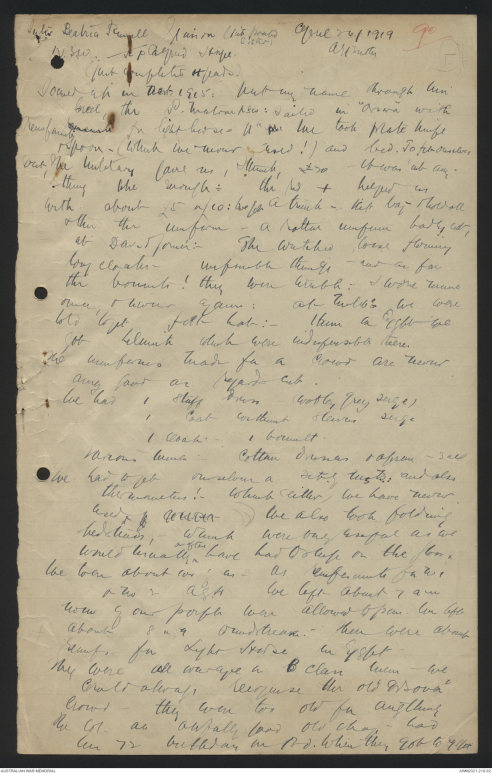
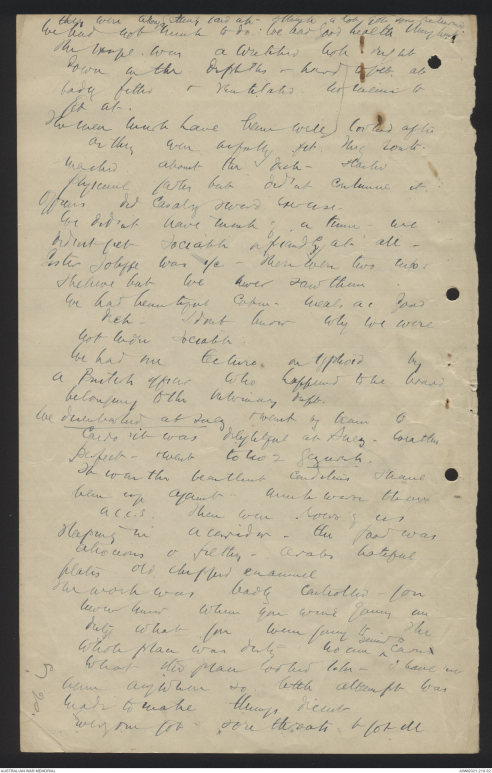
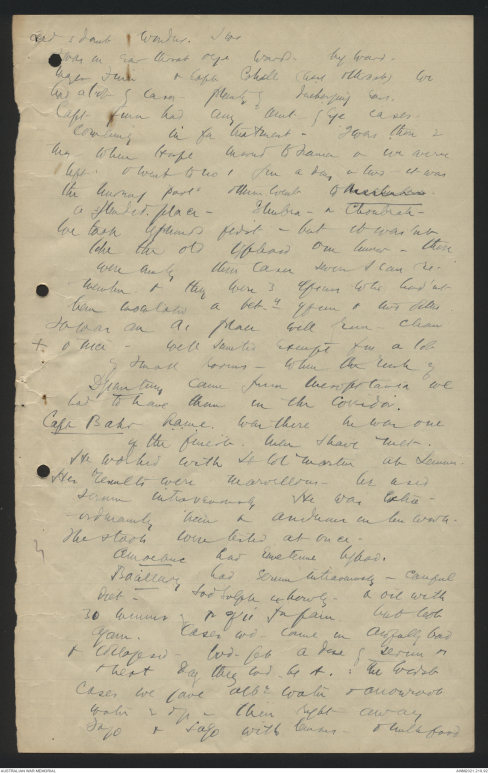
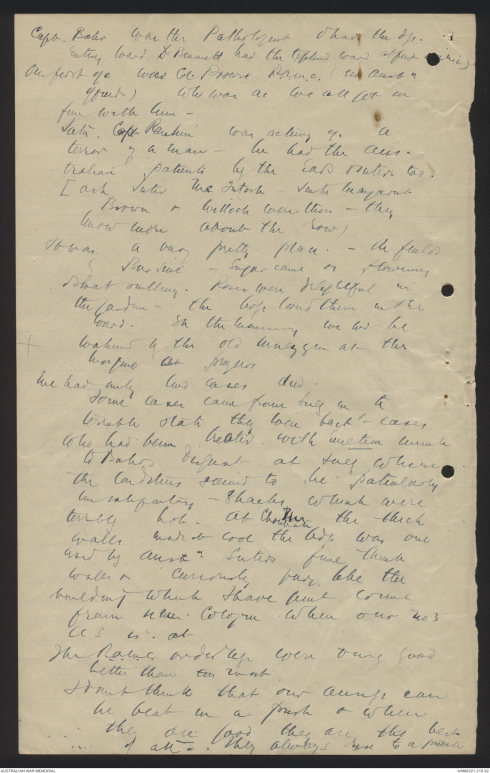
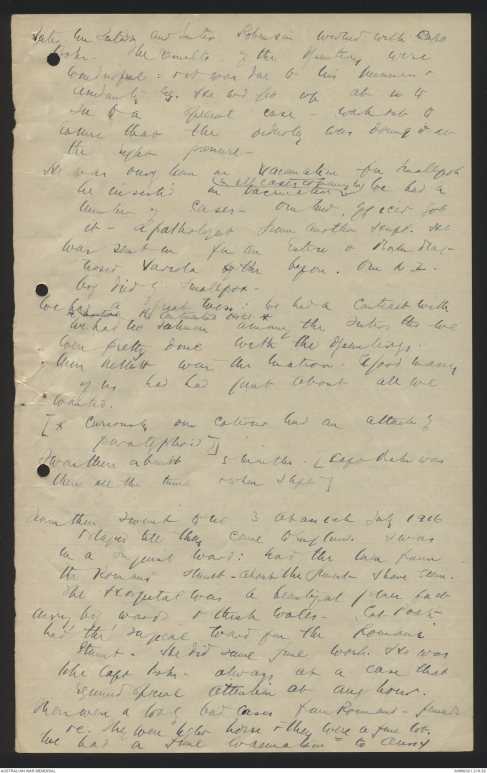
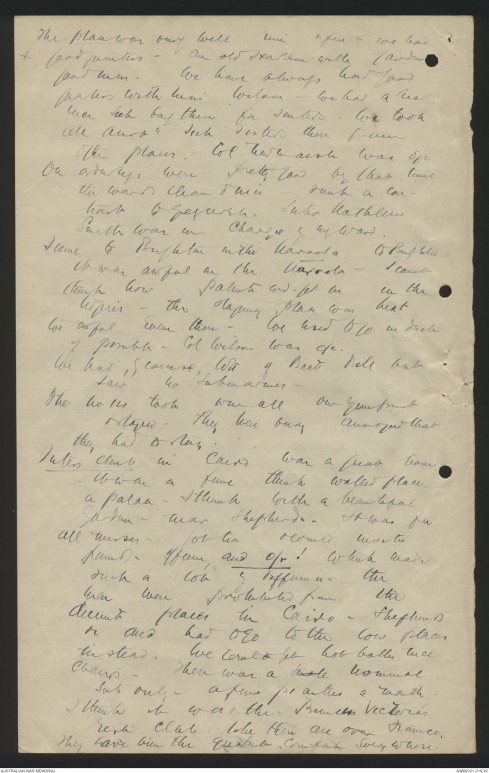
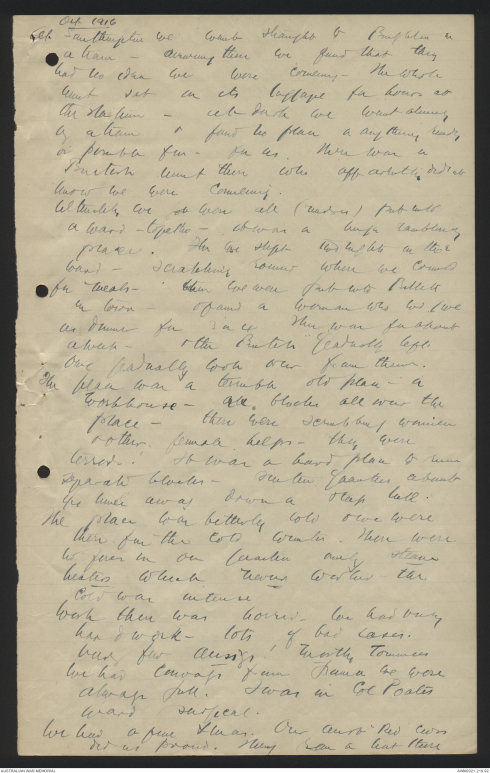
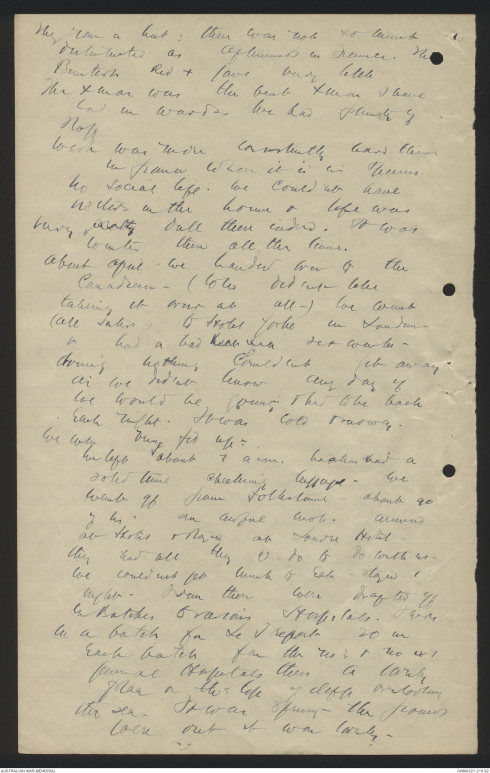
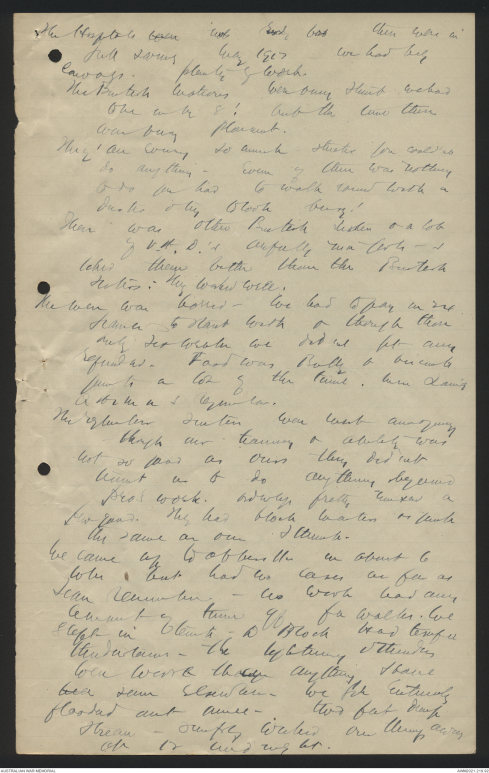
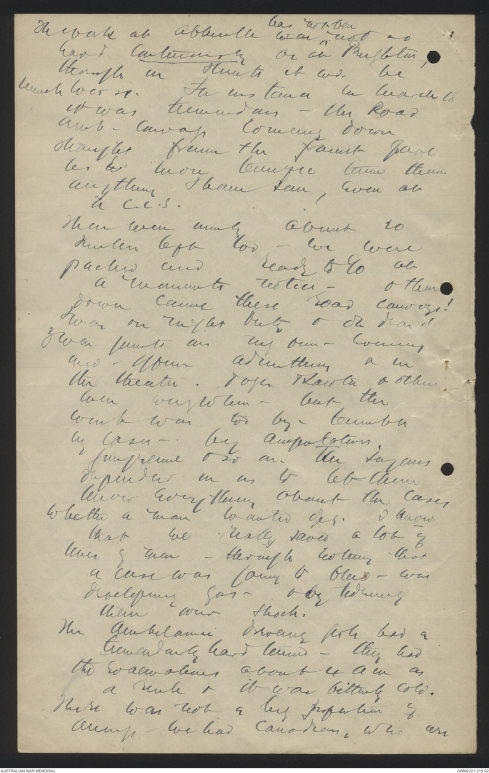
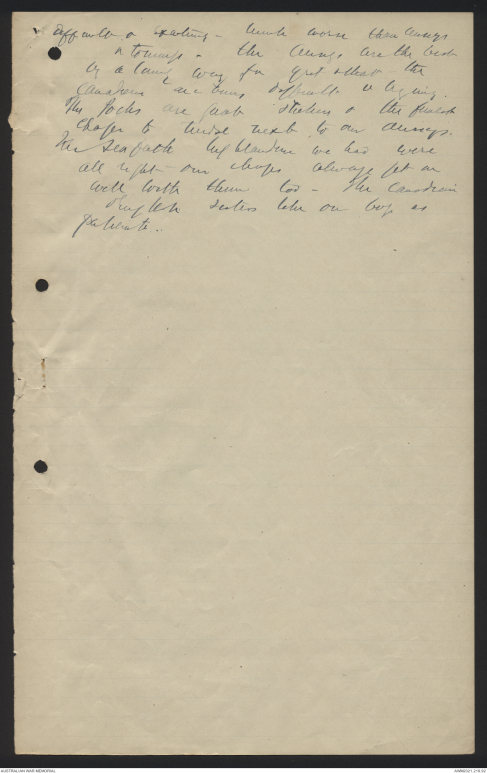
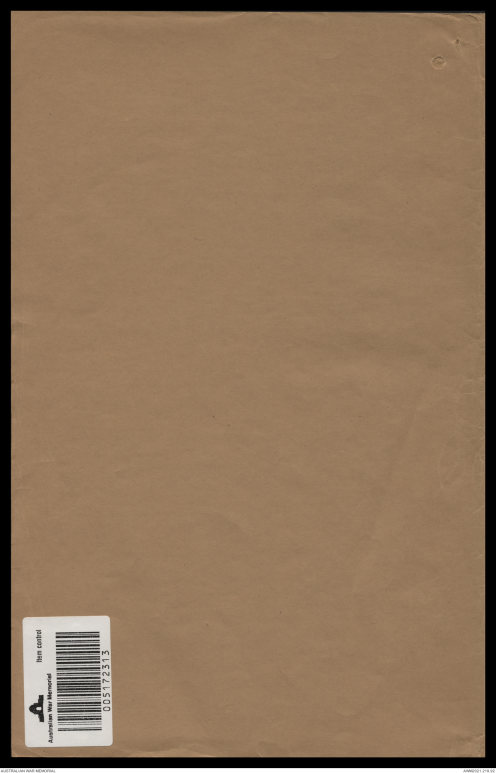
90
Sister Beatrice Russell Glasson Club ward sister
April 26/1919
[[A S Sutton?]]
N.S.W. R P Alfred Hospl.
(just completed 4 years)
Joined up in Oct. 1915: put my name through Miss
Creel, the P. Matron NSW: sailed in "Orsova" withxxxxxx reinforcemts for light horse - 11th xx We took plate knife
& spoon - (which we never used!) and bed. To fit ourselves
out, the Military gave us, I think, £20 - it was'nt anything
like enough. The Red + helped us
with about £5 or £10: we got a trunk - kit bag - & holdall
& then the uniform - a rotten uniform badly cut,
- at David Jones:- The wretched loose flowing
long cloaks - impossible things - and as for
the bonnets! they were terrible: I wore mine
once, & never again: At Melb: we were
told to get felt hats:- then in Egypt we
got helmets which were indispensable there.
The uniforms made for a crowd are never
any good as regards cut.
We had 1 staff dress (woolly grey serge)
1 Coat without sleeves serge
1 Cloak 1 bonnet
various linens Cotton dresses & apron - 3 all
We had to get ourselves a set of insts: and also
thermometers!- which (either) we have never
used, x xxxxxx We also took folding
bedsteads, which were very useful as we
would usually ^or often have had to sleep on the floor.
We were about 100 of us - as reinforcemts for No 1
& No 2 A.G.H. We left about 7 am
None of our people were allowed to pass. We left
about 8 or 9 to midstream. - There were about
reinfs for Light Horse in Egypt.
They were all average or B Class men - we
could always recognise the old "Orsova"
crowd - they were too old for anything.
The Col - an awfully good old chap - had
his 72 birthday on brd. When they got to Egypt
they were always getting laid up. Although a lot got soon returned.
We had not much to do; we had good health throughout.
The Hospl. was a wretched hole right
down in the depths - hard to get at
badly fitted & ventilated, no means to
get at.
The men must have been well looked after
or they were awfully fit. They route
marched about the deck - started
physical jerks but did'nt continue it.
Officers did cavalry sword exercise.
We did'nt have much of a time - we
did'nt get sociable or friendly at all -
Sister Joliffe was i/c - There were two M.Os.
I believe, but we never saw them.
We had beautiful cabins, meals as good
[[?]] - I dont know why we were
not more sociable.
We had one lecture on Typhoid by
a British Officer who happened to be board
belonging to the Veterinary Dept.
We disembarked at Suez & went by train to
Cairo - it was delightful at Suez - weather
perfect - & went to No. 2 Ghezireh.
It was the beastliest conditions I have
been up against - much worse than
A.C.C.S. There were rows of us
sleeping in a corridor - the food was
atrocious v filthy - Arabs hateful
plates old chipped enamel
The work was badly controlled - you
never knew when you were going on
duty what you were going to. The
whole place was dirty. No one ^seemed to carex
what the place looked like- I have not
been anywhere where so little attempt was
made to make things decent.
Everyone got sore throats. I got ill
[*Shorthand*]
and I don't wonder. I was
I was in Ear, Throat and Eye Ward - big ward -
Major Finn and Capt. Cahill (ears & throats). We
had a lot of cases - plenty of discharging ears.
Capt. Finn had any amt of eye cases
coming in for treatment. I was there 2
mths when Hospl moved to France & we were
left. I went to No 1 for a day or two - it was
the turning "pool" - & then went to [[?]]
a splendid place - Shubra - & Choubrak -
We took typhoids first, but it was not
like the old typhoid one knew - there
were only three cases which I can remember
& they were 3 officers who had'nt
been inoculated - a [[Vet. 4?]] officer and two others.
It was an A1 place, well run - clean
& nice - well suited except for a lot
of small rooms - When the rush of
Dysentery came from Mesopotamia we
had to have them in the corridor.
Capt. Bahr, R.A.M.C. was there he was one
of the finest men I have met.
He worked with Lt Col. Martin at Lemnos -
His results were marvellous - He used
serum intravenously. He was extraordinarily
keen & assiduous in his work.
The stools were tested at once.
Amoebic had Emetine hypod.
Bacillary had serum intravenously - careful
diet - Sod. Sulph. 4 hourly - & oil with
30 minns to give for pain but not
again. Cases wd come in awfully bad
& collapsed - wd get a dose of serum &c
& next day they wd be A. The worst
cases we gave albm. water & arrowroot
water 2 ozs - then right away
sago & sago with [[?]] & milk food.
Capt. Bahr was the Pathologist & had the dysentery
ward. Dr Bennett had the typhoid ward at first [[?]].M.C.).
Our first o/c was Col. Prowse, R.A.M.C. (no Austn
officers) who was A1. We all got on
fine with him -
Later, Captain Rankin was acting o/c. A
terror of a man - he had the Australian
patients by the ears & sisters too.
[Ask Sister McIntosh - Sister Margaret
Brown & Willoch were there - they
know more about the row]
It was a very pretty place - the fields
of [[Bursine?]] - sugar cane & flowering
sweet smelling. Roses were delightful in
the garden - the boys loved them in the
ward. In the morning we wd be
wakened by the old Muezzin at the
mosque at prayers
We had only two cases died.
Some cases came from Suez in a
terrible state they were bactl. cases
who had been treated with emetine much
to Bahr's disgust - at Suez where
the conditions seemed to be particularly
unsatisfactory - shacks which were
terribly hot. At Choubra the thick
walls made it cool the bldg was one
used by Austn Sisters fine thick
walls & curiously very like the
building which I have just come
from near Cologne where our No. 3
CCS is at.
The R.A.M.C. orderlys were very good
better than xx most.
I don't think that our arrangements can
be beat in a push & when
they are good they are the best
of all. They always rise to a pinch.
Sister McIntosh and Sister Robinson worked with Capt.
Bahr. The results of the Dysentery were
wonderful: & it was due to his keenness &
assiduity eg. He wd get up ab 4 to
see to a special case - work out to
ensure that the orderly was doing it at
the right pressure -
He was very keen on vaccination for Smallpox
he insisted on vaccination ^in all cases coming in. We had a
number of cases - One Med. Officer got
it - a pathologist from another Hospl. He
was sent in for an Enteric & Bahr diagnosed
Variola by the before. One N.Z.
boy died of Smallpox -
We had a great Mess; we had a contract witha hotel the Continental Hotel *
We had no sickness among the Sisters tho we
were pretty done with the Dysenterys.
Miss Kellett was the Matron. A good many
of us had had just about all we
wanted.
[* Curiously our caterer had an attack of
paratyphoid].
I was there about 5 months: [Capt Bahr was
there all the time & when I left]
From there I went to No. 3 Abassia July 1916
& stayed till they came to England. I was
in a Surgical Ward: had the cases from
the Romani Stunt - about the finest I have seen.
The Hospital was a beautiful place, had
airy big wards & thick walls - Col. Poste
had the surgical ward for the Romani
Stunt. He did some fine work. He was
like Capt. Bahr - always at a case that
required special attention at any hour.
There were a lot of bad cases from Romani - femurs
&c. They were light horse & they were a fine lot.
We had a fine evacuation to Aussy.
The place was very well run & fine - we had
good quarters - an old Harem with gardens
good men. We have always had good
quarters with [[him?]] Wilson - We had a real
war sick bay then for Sisters. We took
all Austn sick sisters then from
other places. Col. Newmarsh was o/c
Our orderlys were pretty good by that time
the wards clean & nice - such a contrast
to Ghezireh. Sister Kathleen
Smith was in charge of my ward.
I came to Brighton in the Karoola to Brighton -
It was awful in the Karoola - I can't
think how patients wd get on in the
tropics - the sleeping place was heat
too awful even then - We used to go on deck
if possible - Colonel Wilson was o/c.
We had, of course, lots of boat drill but
saw no Submarines -
The No. 14 took over all our equipment
& stayed - they were very annoyed that
they had to stay.
Sisters Club in Cairo was a great boon
It was a fine thick walled place
a palace - I think with a beautiful
garden - near Shepherds. It was for
all nurses - got tea & could invite
friends - officers, and o/r! which made
such a lot of difference. The
men were prohibited from the
decent places in Cairo - Shepherds
&c and had to go to the low places
instead. We could get hot baths nice
chairs - There was a small nominal
sub only - a few piastres a month -
I think it was the Princess Victoria's
Rest Club - like there are over France.
They have been the greatest comfort everywhere.
Oct 1916
At Southampton we went straight to Brighton in
a train - arriving there we found that they
had no idea we were coming - The whole
unit sat on its luggage for hours at
the station - at dark we went along
by a train & found no place or anything ready
or possible for - for us. There was a
British Unit there who apparently did'nt
know we were coming.
Ultimately we xx were all (nurses) put into
a ward - together - it was a huge rambling
place. There we slept two nights in this
ward - scratching round where we could
for meals - then we were put into Billets
in town - & found a women who wd give
us dinner for 3 or 4. This was for about
a week - & then British gradually left
& we gradually took over from them.
The place was a terrible old place - a
workhouse - old blocks all over the
place - there were scrubbing women
& other female helps - they were
terrors. It was a hard place to run
separate blocks - sisters quarters about
¼ mile away down a steep hill.
The place was bitterly cold & we were
there for the cold winter. There were
no fires in our quarters, only steam
heaters which never worked - the
cold was intense.
Work there was horrid - We had very
hard work - lots of bad cases.
Very few Aussys! Mostly Tommies
We had convoys from France we were
always full. I was in Col. Postes
ward surgical.
We had a fine Xmas. Our Aust. Red Cross
did us proud. They ran a hut there
They ran a hut : there was not so much
distributed as afterwards in France. The
British Red + gave very little
The Xmas was the best Xmas I have
had in wards. We had plenty of
staff.
Work was more consistently hard than
in France where it is in spasms.
No social life. We could'nt have
visitors in the home & life was
very pretty dull there indeed. It was
Winter there all the time.
About April we handed over to the
Canadians - (who did not like
taking it over at all -) We went
(all Sisters) to Hotel Yorke in London -
& had a bad xxxxx six weeks -
doing nothing Could'nt get away
as we did'nt know any day if
we would be going & had to be back
each night. It was cold & snowy.
We were very fed up.
We left about 7 a.m. - Matron had a
solid time checking luggage - We
went off from Folkestone - about 90
of us - an awful mob. Arrived
at Hotel & stayed at Louvre Hotel
they had all they cd do to do with us -
We could'nt get much to eat - stayed 1
night. From there were drafted off
in batches to various Hospitals. I was
in a batch for Le Treport 20 in
each batch for the No 3 & No 4
General Hospitals there A lovely
place on the top of cliffs overlooking
the sea. It was Spring - the flowers
were out - it was lovely.
The Hospitals were not xxxx xxx there were in
full swing [[July?]] 1917 We had big
Convoys. plenty of work.
The British Matrons were very strict we had
to be in by 8! but the time there
was very pleasant.
They are every so much stricter you could'nt
do anything - even if there was nothing
to do you had to walk around with a
duster & try to look busy!
There was other British Sisters & a lot
of V.A.D's. - awfully nice girls - I
liked them better than the British
Sisters: they worked well.
The mess was barred - We had to pay in 24
Francs to start with & though there
only six weeks we did'nt get any
refunded. Food was Bully & biscuits
quite a lot of the time. Miss Laing
A.Q.I.M.S.S. regular.
The regular Sisters were most annoying
though our training & ability was
not so good as ours they did'nt
trust us to do anything beyond
pro's work. Orderlys pretty mixed a
few good. They had block waiters &c much
the same as ours I think.
We came up to Abbeville in about 6
weeks but had no cases as far as
I can remember - no work had any
amount of time off for walks. We
slept in tents - D Block Had terrific
thunderstorms - the lightning & thunder
were worse than anything I have
been seen elsewhere. We got entirely
flooded out once - two feet deep
stream - simply washed our things away
at 12 midnight.
The work at Abbeville was ^has not been not so
hard continuously as at Brighton,
though in stunts it wd. be
much worse. For instance in March 18
it was tremendous - the Road
Amb. Convoys coming down
straight from the front gave
us a more terrific time than
anything I have seen, even at
a C.C.S.
There were only about 20
sisters left too - we were
packed and ready to go at
a moments notice - & then
down came these road convoys!
I was on night duty & oh dear!
I was quite on my own - covering
Med Officer admitting & in
the theatre. & often [[?]] & others
were everywhere - but the
work was too big - terrible
big cases - big amputations,
gangrene & so on. The Surgeons
depended on us to let them
know everything about the cases
whether a man wanted ops. I know
that we really saved a lot of
lives of men - through knowing that
a case was going to bleed - was
developing gas - & by [[tiding?]]
them over shock.
The Ambulance driving girls had a
tremendously hard time - they had
the evacuations about 4 am as
a rule & it was bitterly cold.
There was not a big proportion of
Aussys - We had Canadians, who are
difficult & exacting - much worse than Aussys
or Tommys - the Aussys are the best
by a long way for grit & that the
Canadians are very difficult & trying.
The Jocks are great stickers & the finest
chaps to nurse next to our Aussys.
The Seaforth Highlanders we had were
all right - our chaps always got on
well with them too - The Canadian
& English sisters like our boys as
patients.
Australian War Memorial
Item control
005172313
 Loretta Corbett
Loretta CorbettThis transcription item is now locked to you for editing. To release the lock either Save your changes or Cancel.
This lock will be automatically released after 60 minutes of inactivity.